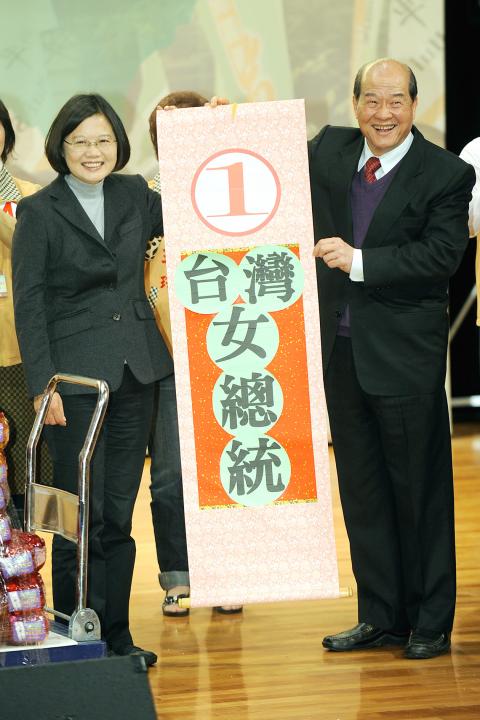Democratic Progressive Party (DPP) presidential candidate Tsai Ing-wen (蔡英文) yesterday received a boost as the Taiwan Solidarity Union (TSU) and a group of academics openly endorsed her bid.
In a speech at the TSU’s 10th anniversary celebration yesterday, Tsai said that during the DPP’s reforms over the past three years, the party has maintained close ties with the TSU and it has been a very enjoyable experience working with them.
Thanking the TSU for throwing its support behind her presidential campaign and the DPP’s legislative nominees, Tsai said she hoped the TSU would be able to pass the threshold required to earn a legislative seat and she looked forward to working with the TSU in the legislature.

Photo: Sean Chao, Taipei Times
Parties are required to receive 5 percent of the vote to nominate candidates for legislator-at-large seats.
Tsai said in her speech that the public was worried that a possible cross-strait peace accord mentioned by President Ma Ying-jeou (馬英九) would deprive the next generation of Taiwanese of a choice about their future, so the current generation should shoulder the responsibility.
“As such, the TSU and the DPP should work together even more closely and guard Taiwan,” she said.
On the nation’s economy, Tsai said the public needs an empathetic government that takes care of those who need help, not like the current government, which thought that every economic problem would be solved with the signing of the Economic Cooperation Framework Agreement (ECFA).
Former president Lee Teng-hui (李登輝), the TSU’s spiritual leader, did not attend the event as he is still recovering from surgery he underwent last month to have a tumor removed.
TSU Chairman Huang Kun-huei (黃昆輝) read a statement on Lee’s behalf, which called for voters to cast their ballots for Tsai for president, the DPP for legislators and the TSU for their party vote.
According to Huang, although the New Party and the People First Party split from the Chinese Nationalist Party (KMT), the current core mentality of KMT decisionmakers was the same “China Unification” path as the New Party, only with a different packaging to attract neutral voters.
“The KMT is using the New Party to make a show and make believe that the KMT is a party of a modest path,” he said.
At a separate setting yesterday, a group of academics, including several from Academia Sinica, formed an alliance in support of Tsai’s presidential bid.
Academia Sinica’s Lin Ming-chang (林明璋) served as honorary convener of the group, while Taiwan Association of University Professors president Chang Yen-hsien (張炎憲) served as the official convener.
Expressing her gratitude, Tsai said that being an Academia Sinica academic was once her dream.
“I am overcome with gratitude and a sense of responsibility today seeing so many academics and scholars show up to support my campaign, “ she said.
Translated by Jake Chung, Staff writer

US President Donald Trump yesterday announced sweeping "reciprocal tariffs" on US trading partners, including a 32 percent tax on goods from Taiwan that is set to take effect on Wednesday. At a Rose Garden event, Trump declared a 10 percent baseline tax on imports from all countries, with the White House saying it would take effect on Saturday. Countries with larger trade surpluses with the US would face higher duties beginning on Wednesday, including Taiwan (32 percent), China (34 percent), Japan (24 percent), South Korea (25 percent), Vietnam (46 percent) and Thailand (36 percent). Canada and Mexico, the two largest US trading

China's military today said it began joint army, navy and rocket force exercises around Taiwan to "serve as a stern warning and powerful deterrent against Taiwanese independence," calling President William Lai (賴清德) a "parasite." The exercises come after Lai called Beijing a "foreign hostile force" last month. More than 10 Chinese military ships approached close to Taiwan's 24 nautical mile (44.4km) contiguous zone this morning and Taiwan sent its own warships to respond, two senior Taiwanese officials said. Taiwan has not yet detected any live fire by the Chinese military so far, one of the officials said. The drills took place after US Secretary

CHIP EXCEPTION: An official said that an exception for Taiwanese semiconductors would have a limited effect, as most are packaged in third nations before being sold The Executive Yuan yesterday decried US President Donald Trump’s 32 percent tariff on Taiwanese goods announced hours earlier as “unfair,” saying it would lodge a representation with Washington. The Cabinet in a statement described the pledged US tariffs, expected to take effect on Wednesday next week, as “deeply unreasonable” and “highly regrettable.” Cabinet spokeswoman Michelle Lee (李慧芝) said that the government would “lodge a solemn representation” with the US Trade Representative and continue negotiating with Washington to “ensure the interests of our nation and industries.” Trump at a news conference in Washington on Wednesday announced a 10 percent baseline tariff on most goods

ACTION PLAN: Taiwan would expand procurement from the US and encourage more companies to invest in the US to deepen bilateral cooperation, Lai said The government would not impose reciprocal tariffs in retaliation against US levies, President William Lai (賴清德) said yesterday, as he announced five strategies to address the issue, including pledging to increase Taiwanese companies’ investments in the US. Lai has in the past few days met with administrative and national security officials, as well as representatives from various industries, to explore countermeasures after US President Donald Trump on Wednesday last week announced a 32 percent duty on Taiwanese imports. In a video released yesterday evening, Lai said that Taiwan would not retaliate against the US with higher tariffs and Taiwanese companies’ commitments to